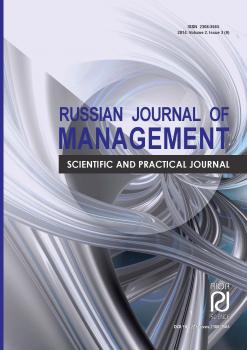This article shows a method of evaluating relative efficiency of regional automobile transport systems based on a set of indicators, which reflect the economic and ecological aspects of their activity. This method is based on the data envelopment analysis methodology, and uses negative ecologic effects of automobile transport development as inputs, which includes the yearly volume of polluting emissions and the area of the land mass used for roads. As outputs, we use the GRP volume and the population of the region. With this definition of the problem, the regions with a minimal integral volume of negative ecologic effects and the maximal possible GRP and population are considered effective. We have presented results of calculations for efficiency measures and target projections on negative ecologic effects (inputs). The calculations were performed using the MaxDEA software, with a radial adaptive algorithm, using statistical data from 2014. With the selected ecological and economic parameters, the following automobile transport systems are considered effective: Moscow Region, Ingushetia Republic, Tatarstan Republic, Penza Region, Sakhalin Region, Chuckotsky Autonomous Region. The least effective are the Kalmykia Republic, the Altai Republic and the Kamchatka Region.
ecological effects, economic efficiency, non-parametric optimization, data envelopment analysis, regional automobile transport systems.
1. Gosudarstvennyy doklad «O sostoyanii i ob okhrane okruzhayushchey sredy v Rossiyskoy Federatsii v 2014 godu». - M.: Rosgidromet, 2015. - 473 s.
2. Iosifov V.V., Dibrova S.V., Podvorok I.I. Regulirovanie negativnogo vozdeystviya avtotransporta na okruzhayushchuyu sredu s pomoshch´yu standartov motornogo topliva (na primere Krasnodarskogo kraya). Natsional´nye interesy: prioritety i bezopasnost´. - 2015. - №39 (324). - S. 48-60.
3. Ratner S.V., Almastyan N.A. Ekologicheskiy menedzhment v Rossiyskoy Federatsii: problemy i perspektivy razvitiya. Natsional´nye interesy: prioritety i bezopasnost´. - 2014. №17. - S. 37-45.
4. Iosifov V.V., Ratner S.V. Analiz bar´erov i perspektiv razvitiya innovatsionnykh tekhnologiy avtomobil´nogo transporta. Innovatsii. - 2016. - № 4. - S. 12-20.
5. Gol´ts G.A. Avtodorozhnyy kompleks v usloviyakh vzryvnoy avtomobilizatsii: tendentsii, zakonomernosti, prognoz. Problemy prognozirovaniya. - 2002. - № 4. - S. 75-83.
6. Khrustalev E.Yu., Ratner P.D. Tekhnologicheskiy progress i energoeffektivnost´ v promyshlennosti i na transporte. Ekonomicheskiy analiz: teoriya i praktika. - 2015. - № 2 (401). - S. 36-44.
7. Piskunov A.A., Ivanyuk I.I., Danilina E.P., Lychev A.V., Krivonozhko V.E. Sistema reytingovaniya regionov s ispol´zovaniem metodologii ASF. Vestnik AKSOR. - 2008. -№ 4. - S. 24-30.
8. Piskunov A.A., Ivanyuk I.I., Lychev A.V., Krivonozhko V.E. Ispol´zovanie metodologii ASF dlya otsenki effektivnosti raskhodovaniya byudzhetnykh sredstv na gosudarstvennoe upravlenie v sub´´ektakh rossiyskoy federatsii. Vestnik AKSOR. - 2009. - № 2. - S. 8-36.
9. Castelli L., Pesenti R., Ukovich W. DEA-like models for the efficiency evaluation of hierarchically structured units//European Journal of Operational Research.2004.No.154(2).P.465-476.
10. Ratner S.V. Zadachi optimizatsii traektoriy razvitiya regional´nykh ekonomicheskikh sistem po ekologicheskim parametram. Drukerovskiy vestnik. - 2016. - № 2. - S. 30-41.
11. Ratner S.V., Ratner P.D. Formirovanie strategii ekologicheskogo menedzhmenta elektrogeneriruyushchikh kompaniy na osnove metodologii analiza sredy funktsionirovaniya. Upravlenie bol´shimi sistemami. - Vyp. 60. - M.: IPU RAN, 2016. - S. 161-187.
12. Ratner S.V., Ratner P.D. Modelirovanie struktury regional´noy energeticheskoy sistemy s ispol´zovaniem metodologii analiza sredy funktsionirovaniya. Russian Journal of Management. - 2015. - T. 3. - № 2. - S. 159-166.
13. Seiford L.M., Zhu J. Modelling undesirable factors in efficiency evaluation//European Journal of Operational Research. - 2002. - № 142. - R. 16-20.
14. Fare R., Grosskopf S., Pasurka(Jr.) C.A. Accounting for air pollution emissions in measures of state manufacturing productivity growth. Journal of Regional Science. - 2001. - №.41. - R. 381-409.
15. Kao C., Hwang S.N. Efficiency decomposition in two-stage data envelopment analysis: an application to non-life insurance companies in Taiwan. European Journal of Operational Research. - 2008. - № 185. - P. 418-429.
16. Liang L., Yang F., Cook W.D., Zhu J. DEA models for supply chain efficiency evaluation. Annals of Operations Research. - 2006. - № 145(1). - P. 35-49.
17. Charnes A., Cooper W.W., Rhodes E. Measuring the efficiency of decision making units. European Journal of Operational Research. - 1978. - № 2. - R.429-444.
18. Ratner S.V., Almastyan N.A. Rynochnye i administrativnye metody upravleniya negativnym vozdeystviem ob´´ektov elektroenergetiki na okruzhayushchuyu sredu. Ekonomicheskiy analiz: teoriya i praktika. - 2015. - № 16. - S. 2-15.
19. Shcherbanin Yu.A. Transport i ekonomicheskiy rost: vzaimosvyaz´ i vliyanie. Evraziyskaya ekonomicheskaya integratsiya. - 2011. - №3. - S.65-78.
20. Gorshkova I.V., Klochkov V.V. Problemy upravleniya razvitiem maloy aviatsii i aviatransporta malonaselennykh regionov Rossii. Regional´naya ekonomika: teoriya i praktika. - 2014. - №47 (374). - S. 36-51.














